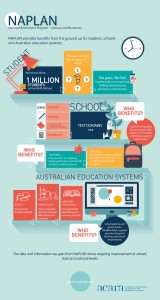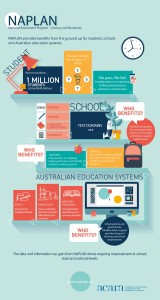Preparing students to undertake the National Assessment Program – Literacy and Numeracy (NAPLAN) testing has become increasingly important in recent years. This is because public perceptions of schools are shaped to some extent by a school’s publicly available NAPLAN results. As reported by ACARA (2010) Australian parents place significant importance on national literacy and numeracy testing for their children; nearly nine in ten parents consider national assessment to be either very important or important. Skills that are tested include: reading, writing, spelling, grammar and punctuation, and numeracy.
The primary focus for preparing Stuartholme students for NAPLAN has been ensuring the key content and skills assessed in NAPLAN are incorporated into the Years 8 and 9 curriculum, so the girls are as prepared as they can be. This is in line with ACARA (2010) recommendations, “The best preparation schools can provide for students is teaching the curriculum, as the tests reflect core elements of the curricula of all states and territories.”
This year we are working to develop common literacy practices in Years 8 and 9. In doing this we have targeted high impact strategies – that is, strategies which evidence suggests make a significant difference to a student’s academic achievement. The three key practices we have focussed on are ‘summarising’, where we have developed a ‘Stuartholme Summarising Process’ – an agreed five-step summarising strategy; ‘note-taking’ where we have developed a ‘Note-taking the Stuartholme Way’ process - a variant of the widely used Cornell note-taking method; and ‘planning for writing’ where we have developed what we call ‘Fish Planning’, the name alluding to the diagram of a fish which is a core element in the ‘planning for writing’ process. After developing and trialling these practices in several classes in 2013, staff were trained in their use and they are now being used across English and Social Science classes in Year 8, across all Social Science classes in Year 9 and some Year 10 History classes. These practices will be rolled out into other academic areas such as Science, Health and Physical Education and Religious Education in 2015.
For each practice exam, a range of resources have been developed to guide teachers and students. These include an agreed learning pathway (based on the ‘gradual release of responsibility model’ of teaching), an info-graphic to use with students and a rubric for teachers to evaluate student progress in the skill.
Over time, our intention is to develop a wide range of common literacy practices. Currently practices around ‘using and writing about evidence’ and ‘teaching vocabulary’ are being developed and trialled in several classes for wider implementation next year.
In the weeks prior to NAPLAN, our goal is to ensure students are well-informed about NAPLAN and why NAPLAN is important. In Mathematics a final testing process is implemented and in English students are led through a final review of key ideas. For example reviewing persuasive writing and ‘polishing’ key aspects such as planning and ‘grabbing the reader’s attention.’
NAPLAN cannot be studied for in a traditional sense and students are not expected to do so. The best way to prepare for NAPLAN is to remember that it is just a routine part of the school programme, and to simply do the best you can on the day.
In preparation for this testing, students are encouraged to have a good night’s sleep, be on time each morning for the tests and eat a good breakfast. Girls are also encouraged to bring a healthy morning tea and make sure they come prepared with all the necessary equipment for the tests.
Michael Elliott, Integrated Curriculum Coordinator
References
ACARA. (2010). Submission to the Senate Education, Employment and Workplace Relations Committee Inquiry into the administration and reporting of NAPLAN testing. Downloaded from http://www.nap.edu.au/_Documents/PDF/ACARA%20(2010)%20- %20NAPLAN%20senate%20inquiry.pdf
Faulkner V, Grace Oakley, Mary Rohl, Elaine Lopes and Alex Solosy. (2012).
I know it is important but is it my responsibility? Embedding literacy strategies across the middle school curriculum, Education 3-13. International Journal of primary, Elementary and Early years Education, 40(1): 35-47
The Literacy and Numeracy Secretariat. (2008). Using Data to Improve Student performance. What Works? Research into Practice Research Monograph #15. Retrieved from http://www.edu.gov.on.ca/eng/literacynumeracy/inspire/research/Using_Data.pdf




